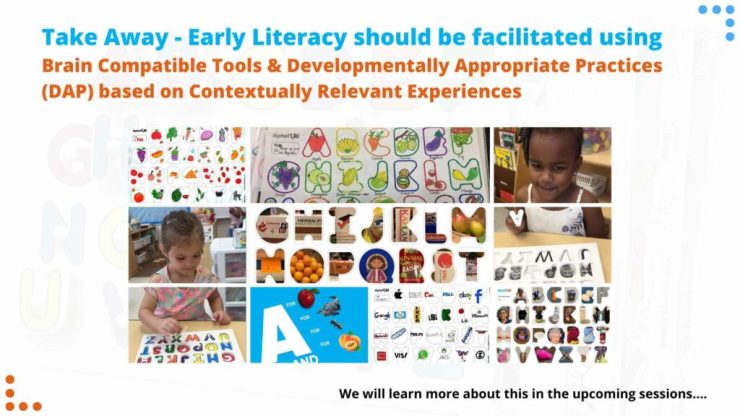Imagine the human brain as a vast library with countless shelves, each holding important information stored in neatly organized folders. Among these folders, one particular section is dedicated to the magical world of early literacy. Just like a librarian handpicks books for young readers, parents, educators, and caregivers play a crucial role in selecting the right tools and practices to unlock the door to literacy in a child’s brain. In this article, we’ll explore how Brain-Compatible Tools & Developmentally Appropriate Practices (DAP) based on Contextually Relevant Experiences can ignite the flames of curiosity and learning in young minds, paving the way for a lifelong love of reading and knowledge.

Understanding the Brain’s Literacy Storage System
In the brain’s literacy section, information is organized using the Scheme Theory. Here, the brain connects, categorizes, and stores data related to each aspect of literacy, such as letters, phonics, and vocabulary. To illustrate this, let’s focus on the letter ‘M.’ The brain will effortlessly connect it to memories, stories, and experiences associated with words like ‘Mother,’ ‘Music,’ ‘Marvelous,’ and more. Just like a well-maintained filing system, the brain ensures that these connections are strong, making it easier for children to retrieve and add new information to their letter ‘M’ folder.

Early Literacy with Brain-Compatible Tools
To create an enriching early literacy environment, we need a special toolbox filled with Brain-Compatible Tools. These tools align with the brain’s natural way of learning, sparking curiosity and making the process enjoyable for children. Let’s take a look at some essential tools:
- Phonics Puzzles: These puzzles engage children’s minds in recognizing and connecting letters with their corresponding sounds, enhancing phonemic awareness.
- Storytelling Corner: A designated area for storytelling allows children to immerse themselves in rich narratives, fostering language development and a deeper understanding of the world around them.
- Interactive Word Walls: Word walls that the children can interact with and manipulate help reinforce vocabulary and spelling in a fun and engaging way.
Developmentally Appropriate Practices (DAP) – Guiding the Journey
Every child’s literacy journey is unique, and Developmentally Appropriate Practices (DAP) ensure that the learning experience is tailored to suit their individual needs. DAP takes into account a child’s age, interests, and abilities, ensuring that the pace of learning is neither too slow nor overwhelming.
- Emergent Literacy Activities: For young children, activities that encourage exploration, such as playing with magnetic letters or scribbling, lay a strong foundation for future reading and writing skills.
- Reading Buddies: Pairing older children with younger ones creates a supportive learning environment where the younger ones learn from their peers and build positive associations with reading.
- Literacy-Rich Playtime: Incorporating literacy into playtime through imaginative games and storytelling allows children to naturally develop language skills while having fun.
Contextually Relevant Experiences – The Key to Engagement
The brain craves real-world relevance, and Contextually Relevant Experiences are the key to unlocking its true potential. When learning is connected to a child’s daily life, their brains become naturally curious and eager to explore.
- Field Trips to the Library: A trip to the local library exposes children to a treasure trove of books, widening their literary horizons and instilling a love for reading.
- Cooking Adventures: Cooking together presents opportunities to read recipes, measure ingredients, and explore food-related vocabulary in a practical context.

Final Thoughts
Just as a gardener nurtures a seed to grow into a beautiful flower, early literacy should be cultivated with care, using Brain-Compatible Tools & Developmentally Appropriate Practices (DAP) based on Contextually Relevant Experiences. When we provide children with the right tools, practices, and experiences, we pave the way for a lifelong love of reading, unlocking their potential and setting them on a path of knowledge and discovery. Let’s embark on this magical journey together, as we empower young minds to explore the wonders of literacy and creativity.




